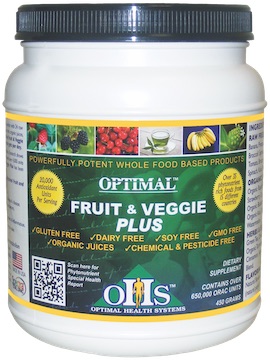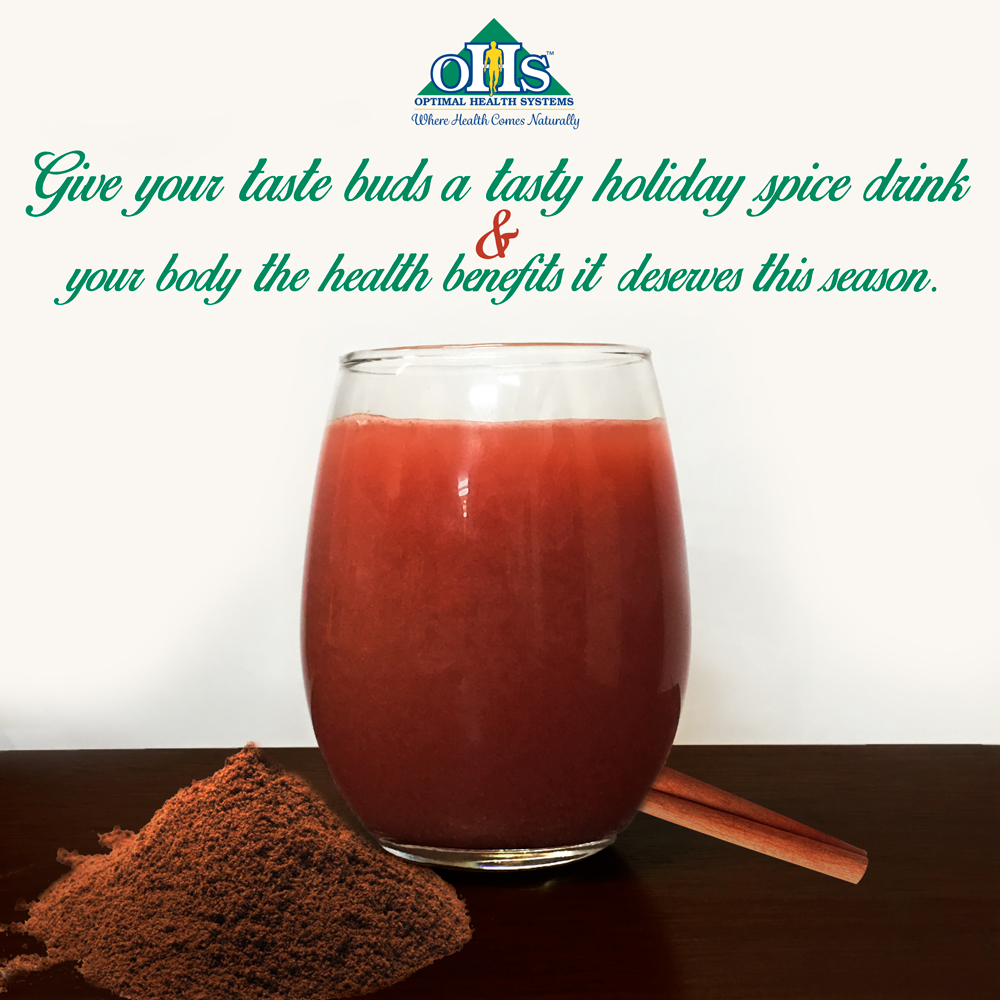
Using Optimal Fruit & Veggie Plus, you can get in a full day’s servings of fruits and vegetables and an impressive 20,000 antioxidant units while enjoying the flavor of the holidays.
Try this holiday recipe that includes our Fruit & Veggie Plus powder:
- 1 scoop Optimal Fruit & Veggie Plus
- Add a pinch of cinnamon, or add to taste
- Add a pinch of nutmeg, or add to taste
Fruits, Vegetables, and Cardiovascular Disease
There is compelling evidence that a diet rich in fruits and vegetables can lower the risk of heart disease and stroke.
The largest and longest study to date, done as part of the Harvard-based Nurses’ Health Study and Health Professionals Follow-up Study, included almost 110,000 men and women whose health and dietary habits were followed for 14 years. The higher the average daily intake of fruits and vegetables, the lower the chances of developing cardiovascular disease. Compared with those in the lowest category of fruit and vegetable intake (less than 1.5 servings a day), those who averaged 8 or more servings a day were 30% less likely to have had a heart attack or stroke. (2)
Although all fruits and vegetables likely contribute, green leafy vegetables such as lettuce, spinach, Swiss chard, and mustard greens, cruciferous vegetables such as broccoli, cauliflower, cabbage, Brussels sprouts, bok choy, and kale, and citrus fruits such as oranges, lemons, limes, and grapefruit (and their juices) make important contributions.
Fruits and Vegetables, Blood Pressure, and Cholesterol
High blood pressure is a primary risk factor for heart disease and stroke. As such, it’s very important to control these conditions.
Diet can be a very effective tool for lowering blood pressure. One of the most convincing associations between the two was found in the Dietary Approaches to Stop Hypertension (DASH) study. (3) This trial examined the effect on blood pressure on a diet rich in fruits, vegetables, and low-fat dairy products, and restricted the amount of saturated and total fat. Researchers found that people with high blood pressure who followed this diet reduced their systolic blood pressure (the upper number of a blood pressure reading) by about 11 mm Hg and their diastolic blood pressure (the lower number) by almost 6 mm Hg – as much as medications can achieve.
Eating more fruits and vegetables can also help lower cholesterol. In the National Heart, Lung, and Blood Institute’s Family Heart Study, the 4466 subjects consumed on average just over 3 servings of fruits and vegetables a day. Men and women with the highest daily consumption (more than 4 servings) had significantly lower levels of LDL (bad) cholesterol than those with lower consumption.(4) How fruits and vegetables lower cholesterol is still something of a mystery. It is possible that eating more fruits and vegetables means eating less meat and dairy products, and thus less cholesterol-boosting saturated fat. Soluble fiber in fruits and vegetables may also block the absorption of cholesterol from food.
Fruits, Vegetables, and Cancer
Numerous early studies revealed what appeared to be a strong link between eating fruits and vegetables and protection against cancer. But because many of these were case-control studies, it is possible the results may have been skewed by problems inherent in these types of studies, such as recall bias and selection bias. Data from cohort studies that follow large groups of initially healthy individuals for years have not consistently shown that a diet rich in fruits and vegetables prevents cancer in general.
Data from the Nurses’ Health Study and Health Professionals Follow-up Study support this finding. Over a 14-year period, men and women with the highest intake of fruits and vegetables (8+ servings a day) were just as likely to have developed cancer as those who ate the fewest daily servings (under 1.5).(2)
A more likely possibility is that fruits and vegetables may protect against certain cancers. The International Agency for Research on Cancer, which is part of the World Health Organization, recently completed a monumental review of the best research on fruits, vegetables, and cancer. The 387-page tome concludes, “There is limited evidence for a cancer-preventive effect of consumption of fruit and of vegetables for cancers of the mouth and pharynx, esophagus, stomach, colon-rectum, larynx, lung, ovary (vegetables only), bladder (fruit only), and kidney. There is inadequate evidence for a cancer-preventive effect of consumption of fruit and of vegetables for all other sites.” (5)
However, considering all evidence from human epidemiological, animal, and other types of studies, it appears that eating more fruit “probably lowers the risk of cancers of the esophagus, stomach and lung” and “possibly reduces the risk of cancers of the mouth, pharynx, colon-rectum, larynx, kidney, and urinary bladder.” Eating more vegetables “probably lowers the risk of cancers of the esophagus and colon-rectum” and “possibly reduces the risk of cancers of the mouth, pharynx, stomach, larynx, lung, ovary and kidney.”
Keep in mind that this is for total fruit and total vegetable consumption and that, as pointed out by the International Agency for Research on Cancer, specific fruits and vegetables may protect against specific types of cancer. For example, a line of research stemming from a finding from the Health Professionals Follow-up Study suggest that tomatoes may help protect men against prostate cancer, especially aggressive forms of it. (6-8) One of the pigments that give tomatoes their red hue – lycopene – could be involved in this protective effect. Although several studies other than the Health Professionals’ study have also demonstrated a link between tomatoes or lycopene and prostate cancer, others have not or have found only a weak connection.
Taken as a whole, however, these studies suggest that increased consumption of tomato-based products (especially cooked tomato products) and other lycopene-containing foods may reduce the occurrence or progression of prostate cancer. But more research is needed before we know the exact relationship between fruits and vegetables, carotenoids, and prostate cancer.(9)
Fruits, Vegetables, and Gastrointestinal Health
One of the wonderful components of fruits and vegetables is their indigestible fiber. As fiber passes through the digestive system, it sops up water like a sponge and expands. This can calm the irritable bowel and, by triggering regular bowel movements, can relieve or prevent constipation.(10) The bulking and softening action of insoluble fiber also decrease pressure inside the intestinal tract and so may help prevent diverticulosis (the development of tiny, easily irritated pouches inside the colon) and diverticulitis (the often painful inflammation of these pouches).(11)
Fruits, Vegetables, and Vision
Eating plenty of fruits and vegetables also keeps your eyes in good shape. You may have learned that the vitamin A in carrots aids night vision. Other fruits and vegetables help prevent two common aging-related eye diseases, cataract and macular degeneration, which afflict millions of Americans over age sixty-five. Cataract is the gradual clouding of the eye’s lens, a disk of protein that focuses light on the retina. Macular degeneration is caused by cumulative damage to the macula, the center of the retina. It starts as a blurred spot in the center of what you see. As the degeneration spreads, vision shrinks.
Free radicals generated by sunlight, cigarette smoke, air pollution, infection, and metabolism cause much of this damage. Dark green leafy vegetables contain two pigments, lutein and zeaxanthin, that accumulate in the eye. These two appear to be able to snuff out free radicals before they can harm the eye’s sensitive tissues.(12)
In general, a diet rich in fruits, vegetables, and whole grains appears to reduce the chances of developing cataracts or macular degeneration. (13-15)

The Bottom Line: Recommendations for Fruit and Vegetable Intake
Fruits and vegetables are clearly an important part of a good diet. Almost everyone can benefit from eating more of them, but variety is as important as quantity. No single fruit or vegetable provides all of the nutrients you need to be healthy. The key lies in the variety of different fruits and vegetables you eat.
PS – Even the government is in a festive mood because they allow us to make 9 health claims with this drink:
PROMOTES
Cardiovascular health, healthy glucose metabolism, healthy vision, healthy inflammatory response, healthy brain function, and healthy aging.
SUPPORTS
Healthy immune response, healthy skin, and urinary tract health.
References
1. Gillman JAMA. 1995:273;1113 Fruit and Vegetable consumption reduces risk of stroke.
2. Hung HC, Joshipura KJ, Jiang R, et al. Fruit and vegetable intake and risk of major chronic disease. J Natl Cancer Inst 2004; 96:1577-84.
3. Appel LJ, Moore TJ, Obarzanek E, et al. A clinical trial of the effects of dietary patterns on blood pressure. DASH Collaborative Research Group. N Engl J Med 1997; 336:1117-24.
4. Djousse L, Arnett DK, Coon H, Province MA, Moore LL, Ellison RC. Fruit and vegetable consumption and LDL cholesterol: the National Heart, Lung, and Blood Institute Family Heart Study. Am J Clin Nutr 2004; 79:213-7.
5. Vainio H, Bianchini F. IARC Handbooks of Cancer Prevention: Fruit and Vegetables. Vol. 8. Lyon, France, 2003.
6. Giovannucci E, Ascherio A, Rimm EB, Stampfer MJ, Colditz GA, Willett WC. Intake of carotenoids and retinol in relation to risk of prostate cancer. J Natl Cancer Inst 1995; 87:1767-76.
7. Gann PH, Ma J, Giovannucci E, et al. Lower prostate cancer risk in men with elevated plasma lycopene levels: results of a prospective analysis. Cancer Res 1999; 59:1225-30.
8. Giovannucci E, Rimm EB, Liu Y, Stampfer MJ, Willett WC. A prospective study of tomato products, lycopene, and prostate cancer risk. J Natl Cancer Inst 2002; 94:391-8.
9. Etminan M, Takkouche B, Caamano-Isorna F. The role of tomato products and lycopene in the prevention of prostate cancer: a meta-analysis of observational studies. Cancer Epidemiol Biomarkers Prev 2004; 13:340-5.
10. Lembo A, Camilleri M. Chronic constipation. N Engl J Med 2003; 349:1360-8.
11. Aldoori WH, Giovannucci EL, Rockett HR, Sampson L, Rimm EB, Willett WC. A prospective study of dietary fiber types and symptomatic diverticular disease in men. J Nutr 1998; 128:714-9.
12. Brown L, Rimm EB, Seddon JM, et al. A prospective study of carotenoid intake and risk of cataract extraction in US men. Am J Clin Nutr 1999; 70:517-24.
13. Moeller SM, Taylor A, Tucker KL, et al. Overall adherence to the dietary guidelines for americans is associated with reduced prevalence of early age-related nuclear lens opacities in women. J Nutr 2004; 134:1812-9.
14. Cho E, Seddon JM, Rosner B, Willett WC, Hankinson SE. Prospective study of intake of fruits, vegetables, vitamins, and carotenoids and risk of age-related maculopathy. Archives of Ophthalmology 2004; 122:883-92.
15. Krinsky NI, Landrum JT, Bone RA. Biologic mechanisms of the protective role of lutein and zeaxanthin in the eye. Annu Rev Nutr 2003; 23:171-201.

